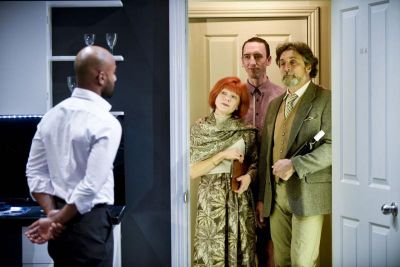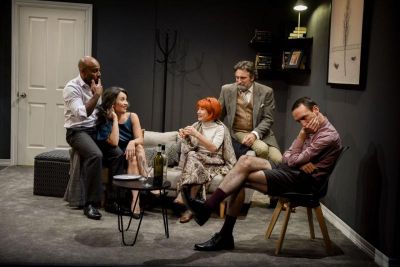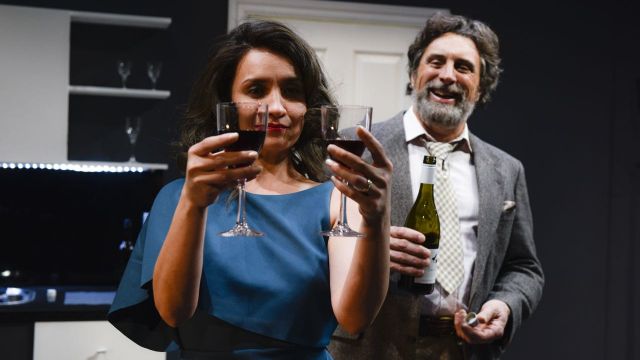Right Now
As this rather discombobulating play begins and you try to get a handle on it – or at least a reference point in the ‘real world’- you might be thinking, ‘Yasmina Reza… meets Harold Pinter?’ There is the polite bourgeois surface – about to be disrupted; there is the sense of imminent menace. A previous reviewer cited Joe Orton and Rosemary’s Baby. All these apply – and then some. Meaning or comprehension keep dissolving, slipping away. The seemingly banal becomes bizarre. Normal social niceties become oppressive. It’s a puzzle play that keeps you off-balance but nevertheless engaged – because it engages your sympathy with its central character - right up to its final reveal.
Young stay-at-home mother Alice (Christina O’Neill) and husband Ben (Dushan Phillips), a doctor, are renovating their new apartment. But Ben is on the night shift, tired and tense, a baby is crying and the marriage looks shaky. But then their neighbour Juliette (Olga Makeeva) invades in the sweetest, most proprietorial and presumptuous way, bringing in her gangly, over-sharing son, Francois (Mark Wilson) and super suave husband Gilles (Joe Petruzzi) – the last a scientist much admired by Ben. Over Alice’s ineffectual protests and Ben’s irritable resistance, these neighbours from across the hall (their apartment is identical, only the other way around) blatantly or insidiously take over Alice and Ben’s lives. Their predations become increasingly sexual. Juliette, a sexual provocateur, teases Ben with a glimpse of her lingerie under her skirt; Gilles is the mature seducer/predator; Francois knows neither tact nor borders.
 Throughout we remain intrigued. Director Katy Maudlin (in her first gig for Red Stitch) has her cast play it dead straight – as if all is perfectly normal. Naturally this makes for comedy. Emily Barrie’s set and Richard Vabre’s lighting bolster the sense of ‘normal’: a perfectly ordinary apartment, rather like the kennels in the endless high rise buildings of our major cities, with perfectly ordinary furniture and fittings, but nevertheless a claustrophobic box, which Alice cannot – dare not? – leave.
Throughout we remain intrigued. Director Katy Maudlin (in her first gig for Red Stitch) has her cast play it dead straight – as if all is perfectly normal. Naturally this makes for comedy. Emily Barrie’s set and Richard Vabre’s lighting bolster the sense of ‘normal’: a perfectly ordinary apartment, rather like the kennels in the endless high rise buildings of our major cities, with perfectly ordinary furniture and fittings, but nevertheless a claustrophobic box, which Alice cannot – dare not? – leave.
Perhaps Ms Makeeva camps it up just that little bit, but her comic timing and calculated reactions are so exact that she is (as usual) a delight. And anyway, is Juliette a real person? Our attention, however, is transfixed by Alice. Here much is due to Christina O’Neill’s delicate performance, one of quiet, understated vulnerability and pathos. Ms O’Neill gives us a disturbed, doubting young woman, a victim of her own misery and self-doubt. Dushan Phillips also keep his performance low-key, but ably negotiates several radical changes of direction and persona. Mark Wilson exploits his long, loose limbs and in-your-face gawkiness that’s initially funny but which can slide into menacing in a second. Joe Petruzzi glides through his role (perhaps the simplest of the characters) with a silky, Alpha-male confidence.
 More of what occurs cannot be said because it would be nothing but spoilers and the play depends on you not having any idea what happens next. The series of developing surprises and reveals, akin to a nightmare where the dreamer may in fact be just in control, removes constraint from the playwright, Catherine-Anne Toupin. There is no logical reason why what occurs does occur, and on one viewing I wonder whether some of the developments are just that little bit arbitrary or contrived for the sake of keeping things ‘weird’. There are crucial turning points for both Alice and Ben that occur on stage simultaneously. You literally do not know where to look and so these important transitions are muddied. But what is fascinating is piecing together – or attempting to – the emotional logic of the play as a whole. Within its ‘weird’ framework, it’s clear that sexual yearning, guilt, loneliness, a desire to escape and yet a desire to surrender and be controlled are all driving forces.
More of what occurs cannot be said because it would be nothing but spoilers and the play depends on you not having any idea what happens next. The series of developing surprises and reveals, akin to a nightmare where the dreamer may in fact be just in control, removes constraint from the playwright, Catherine-Anne Toupin. There is no logical reason why what occurs does occur, and on one viewing I wonder whether some of the developments are just that little bit arbitrary or contrived for the sake of keeping things ‘weird’. There are crucial turning points for both Alice and Ben that occur on stage simultaneously. You literally do not know where to look and so these important transitions are muddied. But what is fascinating is piecing together – or attempting to – the emotional logic of the play as a whole. Within its ‘weird’ framework, it’s clear that sexual yearning, guilt, loneliness, a desire to escape and yet a desire to surrender and be controlled are all driving forces.
The initial laughter becomes less, replaced by rapt attention and the audience leaves comparing interpretations. Is anything real? Is the very last scene – finally – ‘real’? Is it all in Alice’s head? Is there a baby in the next room? Or not? It is an intriguing, puzzling but strangely pleasantly disturbing evening in the theatre.
Michael Brindley
Photographer: Jodie Hutchinson
Subscribe to our E-Newsletter, buy our latest print edition or find a Performing Arts book at Book Nook.

